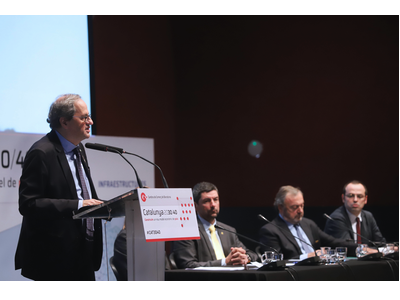- This morning, the head of the government took part in the presentation of a Barcelona Chamber of Commerce study that assesses the economic impact of the deficit in investment by the state
- The report estimates that Catalonia needs €45 billion in infrastructure investment between now and 2030

This morning, the president of the Government of Catalonia, Quim Torra, decried the Spanish government’s failure to meet its commitments when it comes to infrastructure investment in Catalonia. According to the president, the shortfall in investment “hurts all companies and all Catalans”. Torra said: “We have a responsibility to call out the Spanish state’s failure to meet its investment commitments. […] This isn’t about competences; it’s about fiscal sovereignty and sovereignty over infrastructure – in short, sovereignty to be able to decide.” The President stressed: “Our economy, the welfare of our people, and our future as a nation depend on this.”
The head of the government was speaking at the presentation of a study on the economic impact of the deficit in state infrastructure investment in Catalonia. The study, produced by the Barcelona Chamber of Commerce, concludes that Catalonia needs €45.3 billion in investment between now and 2030.
The president congratulated the Chamber of Commerce for the clarity of the report, which he said “puts into figures the impact of the Spanish state’s disengagement from Catalonia, which isn’t easy”.
During his speech, the head of the executive highlighted some figures from the study presented today. For example, if 100% of budgeted investment in transport infrastructure in Catalonia had been executed, this would have generated nearly €20 billion in additional turnover in Catalonia and contributed €8 billion to its GDP (equivalent to 3.3% of Catalonia’s total GDP), while also making it possible to create and maintain 11,501 full-time jobs.
President Torra endorsed the conclusions of the study. “Catalonia is losing ground in the distribution of state investment as we come out of the economic crisis, despite being one of the most dynamic economies over this period,” he said. The president said that the report provides additional evidence to support Catalonia’s grievances and calls for fair distribution of resources to eliminate fiscal and social deficits in Catalonia.
The head of the executive welcomed the fact that an increasing number of organisations – including Foment del Treball (the Catalan employers’ association) and the Cercle d’Economia (a Catalan economic forum) – are decrying the shortfall in investment and calling for Catalonia to be treated fairly. According to the president, the Catalan employers’ association estimates the cumulative deficit in infrastructure investment in Catalonia at €28 billion over the last 10 years. He also echoed the Cercle d’Economia’s complaint that the state is creating a “Federal District of Madrid” by reinvesting any wealth generated in the city itself.
The president emphasised the “immense effort” Catalonia has made to overcome the “jaw-dropping shortfall in investment” reported in the study and reduce unemployment from 23% in 2013 to 9% this year.
The report produced by the Barcelona Chamber of Commerce assesses the opportunity costs associated with the Spanish state’s failure to execute budgeted infrastructure investment and estimates the future investment required to eliminate the cumulative deficit and achieve the desirable level of infrastructure capital stock by 2030.